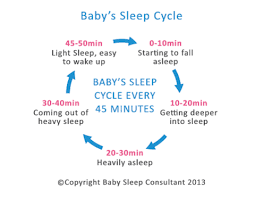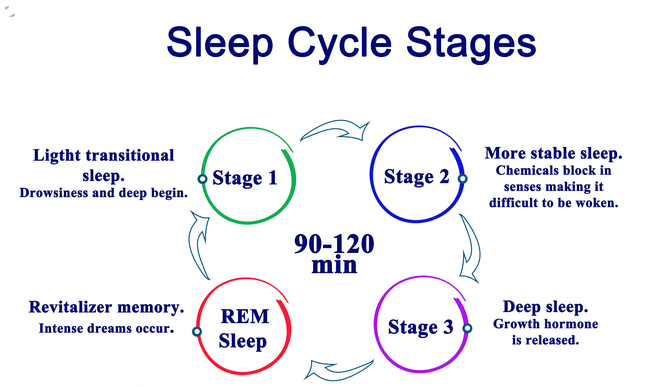Our midwife Laurie Hearley shares some advice of newborn sleep expectations.
One of the most common topics I get asked about at our weekly Parents’ Group is about sleep. How often should my baby be sleeping? Why won’t my baby transfer to the bassinet? Why does my baby cat nap through the day? My baby slept through the night now they are waking multiple times a night – help!
When our newborns first come home from the hospital, they go between feeding and sleeping, therefore interrupted nights are to be expected. Babies need sleep to support their rapid mental and physical development and they need significantly more sleep than an adult. So, how can we support parents to allow them to get some rest, and when do we need to modify some elements to assist our little one to sleep?
Let’s run through how sleep is different for babies.


Baby cycle their sleep in 45 minutes Adults’ cycles are approximately 90 minutes
In those first few months babies will go between two phases of sleep – active and quiet – and spend most of their time in active sleep so they wake to feed often, every 2 – 3 hours.
As adults we produce a hormone called Melatonin. This make us sleepy and peaks at certain times of the day (our biological clock), it allows us to enter long periods of sleep. Cortisol is the hormone that makes us alert and wakes us up.
Babies don’t have these hormones at a good working level until around 4 months of age when they are developing their Circadian Rhythm. This is a bit complicated; it is when our babies need to learn how to sleep in a four-phase cycle and link sleep cycles together. For more detailed information https://www.tuck.com/stages/
They will enter various stages of sleep in these phases – Non-REM (rapid eye movement) light, deep and quiet (REM) sleep. It can be hard work for our babies to learn how to do this! For our little ones, linking sleep cycles is tricky as they need to go back and forward between light and deep sleep. If they have developed crutches to GET THEM TO SLEEP, they will require that again through the night as they enter a light phase of sleep and to enter a deeper sleep.
For example – if a baby only goes to sleep by breastfeeding/being rocked/patted they have not yet developed the skill of resettling into the next sleep cycles because that breast/rock/pat has disappeared, and they are all alone in a bassinet! A surge in the Cortisol hormone is all a baby needs to interrupt their light sleep cycle and cause them to wake. So, reacts like anyone would if their tool to initiate sleep has gone away – they cry out to get it back.
A term I hear a lot, and often in an exhausted tone, is that baby is going through a “Sleep Regression”. Yep. It may feel like that! Parents are tired, they are existing on limited sleep, and some are ready to put actions into place to change this scenario. If we think of it as a progression in sleep and not a regression it can change our mindset about what is happening.
So, what can be done?
Firstly, the parent needs to be ready. It takes some practice and commitment. Making changes can be hard – you may have feeding troubles, or a reflux baby. You may have limited support in your home or other children to care for. You may know baby could sleep better with help, but you are coping okay and not ready to make that commitment yet. We know that lack of sleep for a parent in the long term is detrimental to all aspects of their physical and mental health. As a midwife who has done many years of shift work, it is depleting on many levels. We all want to do the right thing by our babies and finding the right balance can be hard. That is fine, but when you are ready here are some recommendations.
Elaine Harvey, an Internationally Recognized Sleep Consultant, who is a regular guest speaker at our Parents’ Group, has written a step by step guide to Helping your baby learn the skill of how to sleep
Most families will have already developed a bedtime routine organically in their home around evening time. What fine tuning should we expect to have to do?
Let’s give ourselves as much help as we can. Remember that hormone Melatonin? Well, for babies it peaks in the evening. Consistency of a bedtime routine or ritual can’t be emphasised enough. Routine can be very helpful to promote sleep as this hormone will do its job in the right circumstances.
Example of a Sleep Routine:
- • Bedtime should be 20-30 minutes long, feeding should be a component, but not the last step.
- • Bath, stories, songs. If a day nap, a nappy change.
- • Keep it dark – babies are responsive and more alert to light (Cortisol)
- • Remove distractions
- • Use a swaddle or sleeping bag with a comforter
- • Baby settling techniques
Have you heard that saying “Comparison is the thief of joy”. Well yes, especially when it comes to new parents comparing sleep stories! I always joke to new parents that my children were terrible sleepers – the worst! I knew it then and I know it now – but what the worst part about it was thinking everyone else had great sleepers. Well, they probably didn’t, but that’s how it felt. So how long should a baby sleep?
Guidelines according to the Sleep Health Foundation (with some degree of flexibility):
- • Newborns 14 – 17 hours per day (3 – 5 naps)
- • Infants 12 – 15 hours per day (2 – 3 naps)
- • Toddlers 11 – 14 hours per day (1 – 2 naps)
They also classify 5 hours in one stretch being “sleeping through the night” for a newborn. Yes, that’s right – 5 hours! Many parents are very relieved to hear this little gold nugget of information and gain instant reassurance.
If you have any questions about your babies sleep or are keen to hear more, we encourage you to attend an appointment with one of our midwives.
Additional Resources:
Blog post by Laurie Hearley
Comments are closed.

